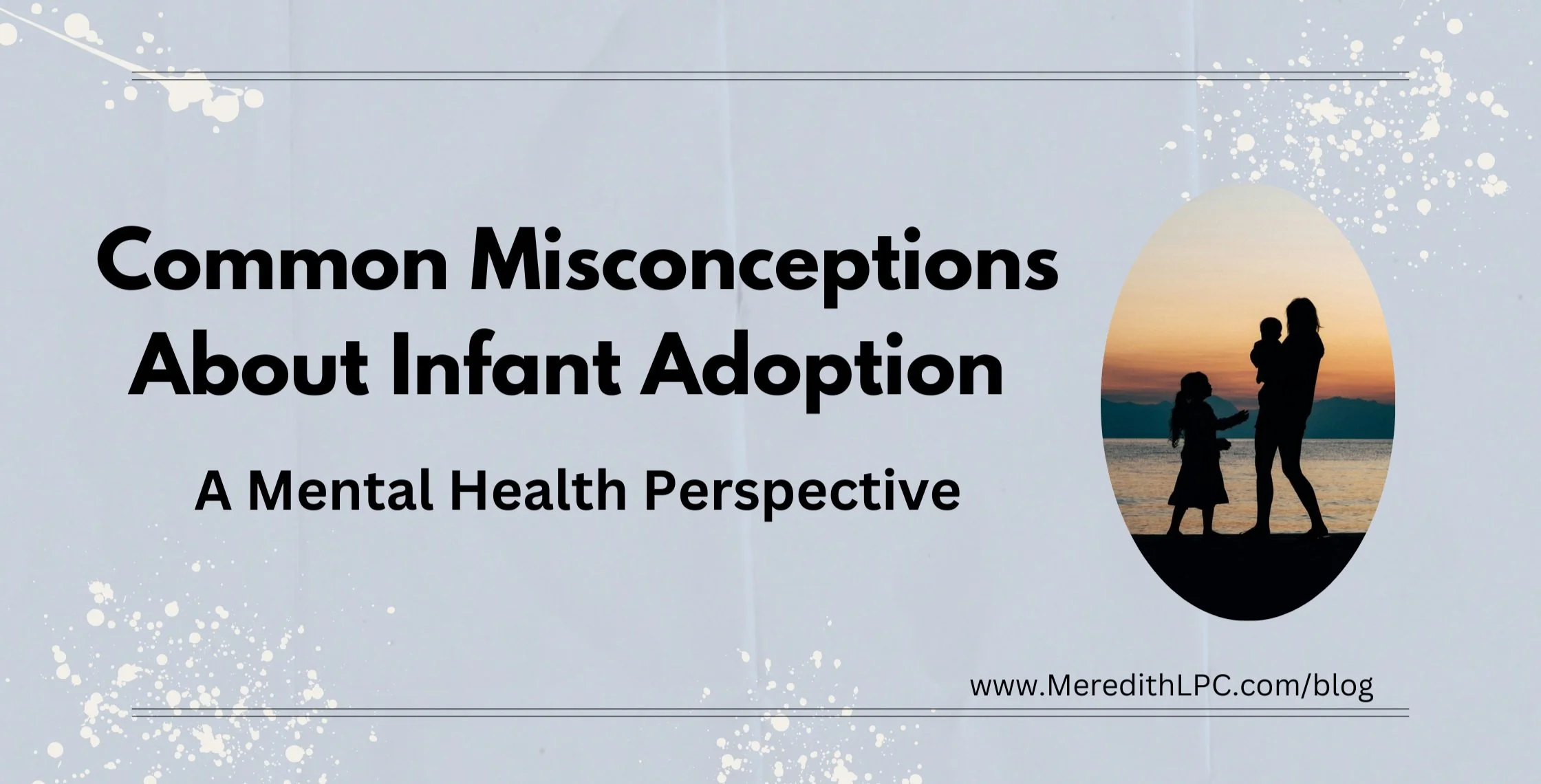Common Misconceptions About Infant Adoption: A Mental Health Perspective
Infant adoption is often portrayed as a joyful, uncomplicated solution for everyone involved—the birth parents make a loving decision, the adoptive parents fulfill their dreams of raising a child, and the adoptee grows up in a happy and stable home. While adoption can certainly be a beautiful and meaningful experience, this simplified narrative ignores the complexity of the process and the lifelong emotional impact on adoptees.
As a therapist with experience working with the adoption constellation, as well as an adult adoptee, I’ve seen firsthand how misconceptions about infant adoption can lead to misunderstandings about adoptees' emotional experiences. Here, I want to address some of the most common myths and provide a mental health perspective to help deepen understanding and support adoptees more effectively.
Misconception #1: "Infants Won’t Remember or Be Affected by Adoption"
One of the biggest myths about infant adoption is the idea that because a baby is adopted at birth or shortly after, they will not experience any emotional challenges related to their adoption. However, research and clinical experience show that adoption is inherently a traumatic event, even when the child is placed in a loving home.
Attachment begins in the womb, and newborns recognize their birth mother’s voice, scent, and heartbeat. Separation from that primary attachment figure can create a primal wound—an early sense of loss that may manifest in ways that adoptees may not even consciously understand until later in life. This does not mean that every adoptee will struggle significantly, but it does mean that their experience should be validated rather than dismissed.
Misconception #2: "Love Is Enough to Erase the Impact of Adoption"
Love is crucial in any parent-child relationship, but it does not erase loss. Adoptive parents may hear well-meaning reassurances like, "They’re so lucky to have you!" or "They won’t even think about being adopted." But this perspective ignores the fact that adoption inherently involves loss—loss of biological family, genetic mirroring, and often, cultural or racial identity.
Many adoptees grapple with feelings of rejection, even if they understand their adoption was not about them personally. The key is to hold space for both the love and the loss, allowing adoptees to process their emotions without feeling guilty for struggling with aspects of their adoption.
Misconception #3: "If an Adoptee Struggles with Identity or Mental Health, Adoption Is to Blame"
While adoption is a factor in an adoptee’s life experience, it is not the sole determinant of their mental health or identity struggles. Adoptees, like anyone else, are shaped by a range of influences, including genetics, environment, and personal experiences.
That being said, adoption does add unique layers to identity development. Questions like, "Who am I?" or "Where do I come from?" can be more complex for adoptees, particularly in transracial or closed adoptions where access to birth family or cultural roots may be limited. Supporting adoptees means acknowledging these complexities while also recognizing that struggling with identity or mental health does not make an adoptee—or adoption itself—pathological.
Misconception #4: "Talking About Adoption Will Make Things Worse"
Some adoptive parents fear that bringing up adoption will plant unnecessary worries in their child’s mind. In reality, adoptees benefit from open and ongoing conversations about their adoption story. When adoption is treated as a taboo topic, it can reinforce feelings of secrecy or shame.
Creating a safe space for adoptees to ask questions and express emotions helps them integrate their adoption story into their identity in a healthy way. This doesn’t mean forcing conversations but rather fostering an environment where adoptees feel free to explore their feelings without fear of upsetting their adoptive parents.
Misconception #5: "Adoptees Should Be Grateful"
One of the most harmful misconceptions is that adoptees should feel grateful for being adopted. While gratitude can certainly be a part of their experience, it should never be an expectation placed on them. Adoption is not a favor—it is a way families are formed, and adoptees, like any child, are entitled to feel a full range of emotions about their life circumstances. Expecting gratitude can invalidate an adoptee’s feelings of loss or identity struggles and make it harder for them to express themselves honestly.
Misconception #6: "Open Adoption Eliminates All Adoption-Related Struggles"
Open adoption—where there is some level of contact between birth and adoptive families—can be beneficial for many adoptees, but it does not erase the complexities of adoption. While having access to birth family members may help answer some questions, it can also create new challenges, such as navigating multiple family relationships or dealing with differences in expectations between adoptive and birth families. Open adoption can be a positive option, but it should not be seen as a “fix” for all adoption-related struggles.
A Balanced Perspective
Understanding these misconceptions does not mean viewing adoption as inherently harmful or problematic. Adoption is a layered and deeply personal experience, and each adoptee’s journey is unique. Acknowledging the presence of loss, trauma, or identity questions does not diminish the love or stability provided by adoptive parents. Instead, it allows for a more compassionate and nuanced understanding of what adoptees may face.
As a therapist, I strive to support adoptees and their families in navigating these complexities with honesty, empathy, and understanding. By challenging misconceptions and encouraging open dialogue, we can create an environment where adoptees feel acknowledged, supported, and empowered in their experiences.
Related Articles: Adoption in This Is Us: A Groundbreaking Representation of Family, Identity, and Belonging
The 7 Core Issues in Adoption: Understanding the Impact on the Adoption Constellation
Chosen Family, Identity, and Belonging: What "Harry Potter" Teaches Us About Adoption


